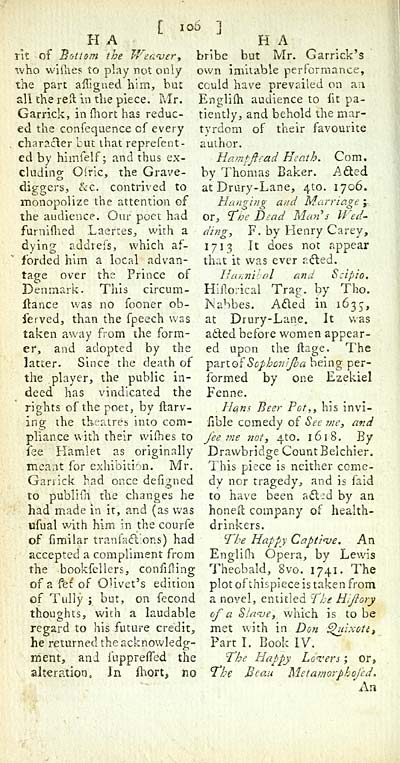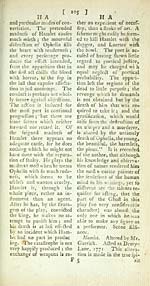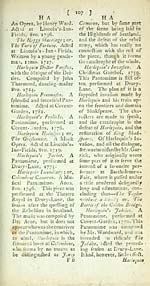Glen Collection of printed music > Printed text > New theatrical dictionary
(120) Page 106
Download files
Complete book:
Individual page:
Thumbnail gallery: Grid view | List view

H A
nt of Bottom the Weaver,
who wiihes to play not only
the part affigned him, but
all the reft in the piece. Mr.
Garrick, in fhort has reduc-
ed the confequence of every
cha racier but that reprefent-
ed by hiinfelf ; and thus ex-
cluding Oiric, the Grave-
diggers, &c. contrived to
monopolize the attention of
the audience. Our poet had
furnimed Laertes, with a
dying addrefs, which af-
forded him a local advan-
tage over the Prince of
Denmark. This circum-
ftance was no fooner ob-
served, than the fpeech was
taken away from the form-
er, and adopted by the
latter. Since the death of
the player, the public in-
deed has vindicated the
rights of the poet, by ftarv-
ing the theatres into com-
pliance with their wifhes to
fee Hamlet as originally
meant for exhibition. Mr.
Garrick had once defigned
to publifn the changes he
had made in it, and (as was
ufual with him in the courfe
of fimilar tranfactions) had
accepted a compliment from
the bookfellers, confiiling
of a fef of OUvet's edition
of Tully ; but, on fecond
thoughts, with a laudable
regard to his future credit,
he returned the acknowledg-
ment, and mppreffed the
alteration. In fhort, no
1 06 ]
H A
bribe but Mr. Garrick's
own imitable performance,
could have prevailed on an
Englifh audience to fit pa-
tiently, and behold the mar-
tyrdom of their favourite
author.
Ha?nffiead Heath. Com.
by Thomas Baker. Acted
at Drury-Lane, 4-to. 1706.
Hangi?ig and Marriage ;,.
or, The Dead Mans Wed-
ding, F. by Henry Carey,
17 1 3 It does not appear
that it was ever acted.
Hannibal and Scipio.
Hiftorical Trag. by Tho.
Nabbes. Acted in 1635,
at Drury-Lane. It was
acled before women appear-
ed upon the ftage. The
part of Soph onifb a being per-
formed by one Ezekiel
Fenne.
Hans Beer Pot,, his invi-
sible comedy of See me, and
fee me not, 4tO. 1618. By
Drawbridge Count Belchier.
This piece is neither come-
dy nor tragedy^ and is faid
to have been acted by an
honeft company of health-
drinkers.
The Happy Captive. An
Englifh Opera, by Lewis
Theobald, 8vo. 1741. The
plot of thispiece is taken from
a novel, entitled The Hifiory
of a Slave, which is to be
met with in Don Quixote,
Part I. Book IV.
The Happy Lovers ; or,
The Beau Metamorphofed.
An
nt of Bottom the Weaver,
who wiihes to play not only
the part affigned him, but
all the reft in the piece. Mr.
Garrick, in fhort has reduc-
ed the confequence of every
cha racier but that reprefent-
ed by hiinfelf ; and thus ex-
cluding Oiric, the Grave-
diggers, &c. contrived to
monopolize the attention of
the audience. Our poet had
furnimed Laertes, with a
dying addrefs, which af-
forded him a local advan-
tage over the Prince of
Denmark. This circum-
ftance was no fooner ob-
served, than the fpeech was
taken away from the form-
er, and adopted by the
latter. Since the death of
the player, the public in-
deed has vindicated the
rights of the poet, by ftarv-
ing the theatres into com-
pliance with their wifhes to
fee Hamlet as originally
meant for exhibition. Mr.
Garrick had once defigned
to publifn the changes he
had made in it, and (as was
ufual with him in the courfe
of fimilar tranfactions) had
accepted a compliment from
the bookfellers, confiiling
of a fef of OUvet's edition
of Tully ; but, on fecond
thoughts, with a laudable
regard to his future credit,
he returned the acknowledg-
ment, and mppreffed the
alteration. In fhort, no
1 06 ]
H A
bribe but Mr. Garrick's
own imitable performance,
could have prevailed on an
Englifh audience to fit pa-
tiently, and behold the mar-
tyrdom of their favourite
author.
Ha?nffiead Heath. Com.
by Thomas Baker. Acted
at Drury-Lane, 4-to. 1706.
Hangi?ig and Marriage ;,.
or, The Dead Mans Wed-
ding, F. by Henry Carey,
17 1 3 It does not appear
that it was ever acted.
Hannibal and Scipio.
Hiftorical Trag. by Tho.
Nabbes. Acted in 1635,
at Drury-Lane. It was
acled before women appear-
ed upon the ftage. The
part of Soph onifb a being per-
formed by one Ezekiel
Fenne.
Hans Beer Pot,, his invi-
sible comedy of See me, and
fee me not, 4tO. 1618. By
Drawbridge Count Belchier.
This piece is neither come-
dy nor tragedy^ and is faid
to have been acted by an
honeft company of health-
drinkers.
The Happy Captive. An
Englifh Opera, by Lewis
Theobald, 8vo. 1741. The
plot of thispiece is taken from
a novel, entitled The Hifiory
of a Slave, which is to be
met with in Don Quixote,
Part I. Book IV.
The Happy Lovers ; or,
The Beau Metamorphofed.
An
Set display mode to: Large image | Transcription
Images and transcriptions on this page, including medium image downloads, may be used under the Creative Commons Attribution 4.0 International Licence unless otherwise stated. ![]()
| Special collections of printed music > Glen Collection of printed music > Printed text > New theatrical dictionary > (120) Page 106 |
|---|
| Permanent URL | https://digital.nls.uk/90316805 |
|---|
| Description | Scottish songs and music of the 18th and early 19th centuries, including music for the Highland bagpipe. These are selected items from the collection of John Glen (1833 to 1904). Also includes a few manuscripts, some treatises, and other books on the subject. |
|---|
| Description | The Glen Collection and the Inglis Collection represent mainly 18th and 19th century Scottish music, including Scottish songs. The collections of Berlioz and Verdi collected by bibliographer Cecil Hopkinson contain contemporary and later editions of the works of the two composers Berlioz and Verdi. |
|---|

